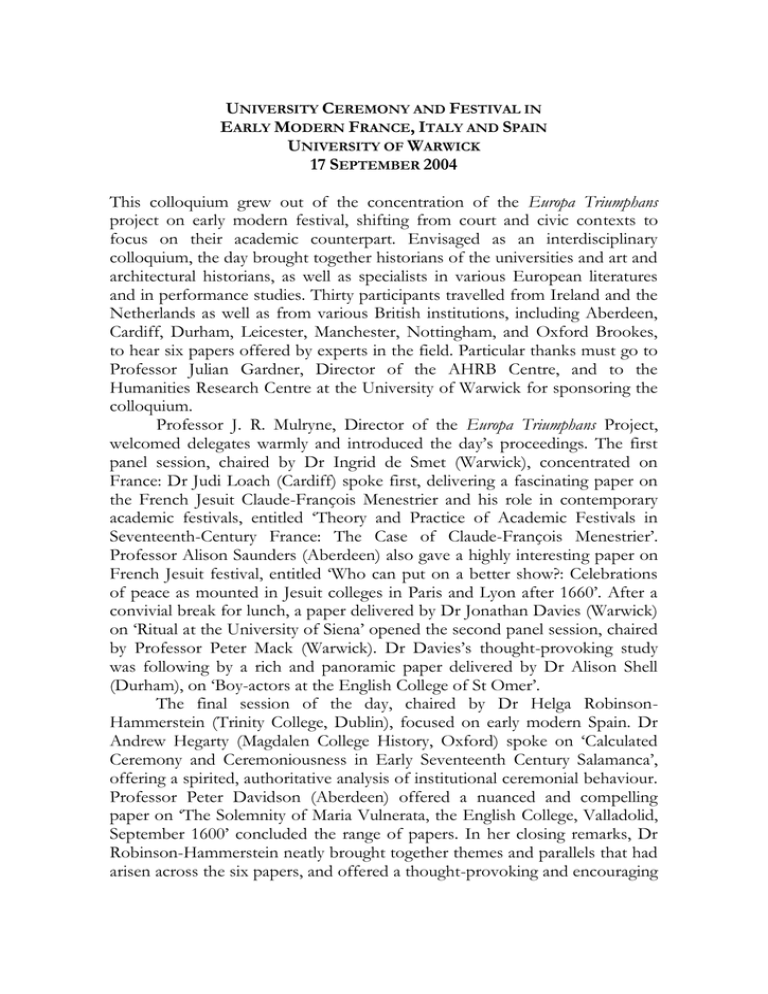U C F
advertisement

UNIVERSITY CEREMONY AND FESTIVAL IN EARLY MODERN FRANCE, ITALY AND SPAIN UNIVERSITY OF WARWICK 17 SEPTEMBER 2004 This colloquium grew out of the concentration of the Europa Triumphans project on early modern festival, shifting from court and civic contexts to focus on their academic counterpart. Envisaged as an interdisciplinary colloquium, the day brought together historians of the universities and art and architectural historians, as well as specialists in various European literatures and in performance studies. Thirty participants travelled from Ireland and the Netherlands as well as from various British institutions, including Aberdeen, Cardiff, Durham, Leicester, Manchester, Nottingham, and Oxford Brookes, to hear six papers offered by experts in the field. Particular thanks must go to Professor Julian Gardner, Director of the AHRB Centre, and to the Humanities Research Centre at the University of Warwick for sponsoring the colloquium. Professor J. R. Mulryne, Director of the Europa Triumphans Project, welcomed delegates warmly and introduced the day’s proceedings. The first panel session, chaired by Dr Ingrid de Smet (Warwick), concentrated on France: Dr Judi Loach (Cardiff) spoke first, delivering a fascinating paper on the French Jesuit Claude-François Menestrier and his role in contemporary academic festivals, entitled ‘Theory and Practice of Academic Festivals in Seventeenth-Century France: The Case of Claude-François Menestrier’. Professor Alison Saunders (Aberdeen) also gave a highly interesting paper on French Jesuit festival, entitled ‘Who can put on a better show?: Celebrations of peace as mounted in Jesuit colleges in Paris and Lyon after 1660’. After a convivial break for lunch, a paper delivered by Dr Jonathan Davies (Warwick) on ‘Ritual at the University of Siena’ opened the second panel session, chaired by Professor Peter Mack (Warwick). Dr Davies’s thought-provoking study was following by a rich and panoramic paper delivered by Dr Alison Shell (Durham), on ‘Boy-actors at the English College of St Omer’. The final session of the day, chaired by Dr Helga RobinsonHammerstein (Trinity College, Dublin), focused on early modern Spain. Dr Andrew Hegarty (Magdalen College History, Oxford) spoke on ‘Calculated Ceremony and Ceremoniousness in Early Seventeenth Century Salamanca’, offering a spirited, authoritative analysis of institutional ceremonial behaviour. Professor Peter Davidson (Aberdeen) offered a nuanced and compelling paper on ‘The Solemnity of Maria Vulnerata, the English College, Valladolid, September 1600’ concluded the range of papers. In her closing remarks, Dr Robinson-Hammerstein neatly brought together themes and parallels that had arisen across the six papers, and offered a thought-provoking and encouraging perspective on how the study of ceremony and festival might be incorporated into wider study of the early modern universities. The papers delivered at the colloquium offered dynamic and original insights into a topic on which relatively little research has been carried out. One of the conclusions many delegates reached was that a study of the subject would be timely and welcome. Dr Sarah Knight, University of Leicester

